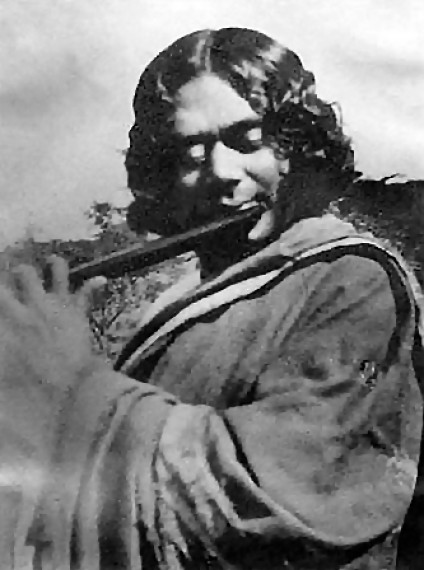
Kazi Najhrul Islam(part-4)

Bangladesh was established as an independent state in 1971 through the Bangladesh War of Independence. On May 24, 1972, Kavi Nazrul and his family were brought to Bangladesh with the permission of the Indian government. The then Prime Minister of Bangladesh Sheikh Mujibur Rahman took special initiative in this regard. The poet spent the rest of his life in Bangladesh. In 1976, an official order was issued to grant Nazrul the citizenship of independent Bangladesh.
After that, despite considerable treatment, Nazrul's health did not improve. In 1974, the poet's youngest son and famous guitarist Kazi Aniruddha died. In 1976, Nazrul's health also began to deteriorate. The last days of his life were spent in the PG Hospital of Dhaka. He died on 29 August 1976. Nazrul wrote in one of his songs, "Bury me next to the mosque, my brother / so that I can hear the muezzin's call from the gore":- Considering this wish of the poet, it was decided to bury the poet next to the Dhaka University Central Mosque and accordingly his tomb was constructed. But Pramila Devi's last wish was that her husband be buried next to her grave (at Nazrul's ancestral home in Churulia). But Pramila's last wish was not fulfilled.
More than 10 thousand people participated in his funeral prayers. After offering Janaza Namaz, President Abu Sadat Mohammad Sayem, Major General Ziaur Rahman, Royal Admiral MH Khan, Air Vice Marshal AG Mahmood, Major General Dastgir carried the body of Nazrul from Suhrawardy Maidan to University Mosque premises10] A two-day state mourning day was observed in Bangladesh to mark his death, and a minute's silence was observed in the Indian legislature in honor of the poet.
On his way back to Calcutta from Comilla in December 1921, Nazrul produced two revolutionary literary works. These two are rebellious poetry and broken song music. They completely changed the genre of Bengali poetry and music. Nazrul gained most popularity for his rebellious poetry. Another famous poem written around the same time is Kamal Pasha - which reflects Nazrul's views on the futility of the Khilafat movement of Indian Muslims and contemporary international historical consciousness. In 1922, his famous poetry collection Agniveena was published. This book of poetry is able to create a novelty in Bengali poetry, through this the world of Bengali poetry changes. The first edition was out of stock soon after its publication. Several new editions were published successively. Some of the most popular poems in this anthology include: "Pralyollas, Agarhini, Kheyapar's Tarani, Shat-il-Arab, Bidrohi, Kamal Pasha" etc. They turned the tide of Bengali poetry. His children's poetry has brought aesthetics to Bengali poetry.
The number of Nazrul's songs is more than four thousand. Nazrul's songs are known as Nazrul Sangeet.
In 1938, Kazi Nazrul Islam officially joined the Calcutta Radio Centre. There he had to write a lot of songs for the three shows 'Haramani', 'Nabragamalika' and 'Gitibichitra' respectively. The program 'Haramani' was aired once a month on Calcutta Betar Kendra where he performed songs on the less popular and almost extinct Ragragini. It should be noted that at the beginning of this program he used to introduce a missing raga and perform a new song written by himself to the tune of that raga. While doing this work, Kazi Nazrul Islam used to read 'M Arifun Nagmat' written by Nawab Ali Chowdhury and various books written by Amir Khusro in Persian language and mastered different types of ragas with their help. He composed more than forty songs on these lost ragas. However, being untidy by nature, Nazrul wrote these songs on scraps of paper, but Jagat Ghatak, the acting editor of the music section of Bharatvarsh monthly, kept them in a thick bound notebook with notation. Unfortunately for Bangla Song, this compiled account was later lost, the notice of which he gave in the daily newspapers of that period but it is no longer available.[11][12]
Nazrul was living with Muzaffar Ahmad in the office of the Bengal Muslim Literary Society after giving up his military life. Muzaffar Ahmad was the pioneer of socialist movement in this country. Nazrul's political consciousness began to develop from here. He used to participate in various political meetings and speeches with Muzaffar Ahmad. From this time he became familiar with socialist ideals. The Russian Socialist Revolution in 1917 affected him in many ways. He published a collection of communist and proletarian poems in his magazines Langal and Ganbani. He also published a translation of the Communist International's Jag Hunger Bandi Oth Re Jat - a blood flag song based on Red Flag published in his newspaper.
Then the non-cooperation movement led by Mahatma Gandhi and the Khilafat movement led by Maulana Muhammad Ali and Shaukat Ali - the objective of the non-cooperation movement was the peaceful withdrawal of the British from India. And the purpose of the Khilafat movement was to maintain the medieval feudal system in Turkey, because the head of this integrated sultanate system, the Sultan of Turkey, was recognized by almost all Muslims as the Caliph of the Muslim world. Nazrul did not believe in the ideals of these two movements. He believed in achieving freedom i.e. swaraj through armed revolution which was contrary to Mahatma Gandhi's philosophy. Again, Nazrul supported the movement led by Mustafa Kemal Pasha to overthrow the Sultanate of Turkey and build a new Turkey. Still he joined the non-cooperation and Khilafat movement. This was because this struggle was being considered as an integral part of the collective anti-imperialist struggle of the two Indian Hindu Muslims.
But by all accounts Nazrul was most influenced by Kamal Pasha in his conception of Rashtriya Dhyana. Nazrul thought that what the Muslims of Turkey have been able to do in their country, why would it not be possible in the Indian subcontinent? Nazrul's position was strict against dogma, conservatism, bigotry, superstition. And the biggest influence behind his position was Kamal Pasha. As such, the hero of his life was Kamal Pasha. Nazrul also attempted to play a similar role in his rebel career. It is to be noted that in the month of September 1921, the first socialist party of India was formed in the house where Muzaffar Ahmad and Nazrul Taltala were staying. Nazrul was also influenced by the Russian Socialist Revolution of 1917. But he himself never became a member of this group, though Comrade Muzaffar was his close friend for life.
He tried to participate in the National Assembly elections of the 1920s. First he went to Calcutta to gain support from the Congress. But not getting much response from Congress, he decided to go it alone. He did not get much success in the elections. After that, his political views continued to be expressed through literature, but his active participation in politics declined.[15]
